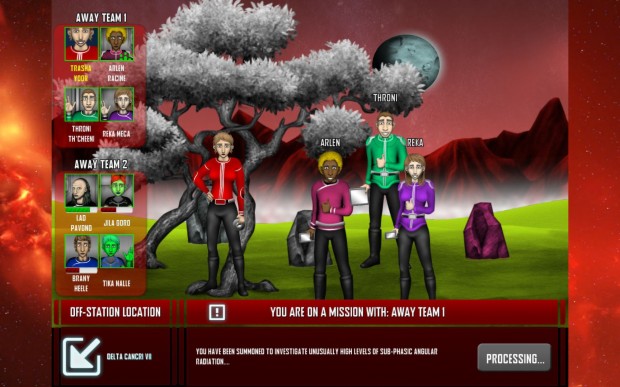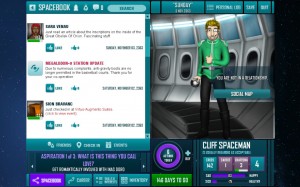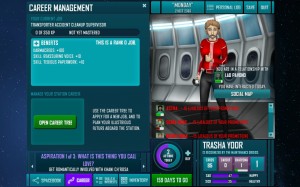Indie Rock: Redshirt
- Updated: 15th Nov, 2013

The goals of Star Trek’s Federation are noble. They are ambassadors of peace and prosperity in a post-scarcity society. A genuine meritocracy removed from pettiness, self absorption and bigotry, where each person works toward a collective goal and is able to put their own needs aside.
Redshirt’s developer Mitu Khandaker doesn’t share Gene Roddenberry’s optimism. The world she’s created in the game contains the same technological advances, but each character retains our modern-day obsession with social media. All of their activities on their off-world station are broadcasted through “Spacebook”, and the way they’re represented on the site is seemingly all anyone cares about.
When a new game procedurally generates characters, their inter-relationships and social standing, your character starts on the lowest rung of the career ladder with a few co-workers as friends. The game’s verbs from this point are all based around self-improvement, either through gaining levels of nonsense space-skills or through capitalising on friendship as currency.
In a brief interview with me Khandaker described this as “the big cynical joke behind the game, the fact that in our grandiose space future Star Trek likes to imagine we’re going to have, people are still going to be really self obsessed. That’s just what people are. It’s playing with how those two concepts are at odds with each other.”
Though the blame isn’t solely levied onto the characters simply acting as their own enemy. Despite Redshirt painting a world where no one needs to go hungry or do without luxuries, the ship’s run on a system of Karmacreds, “which totally isn’t money of course,” Mitu says. “It’s nothing like money because it’s a post-scarcity society, but it’s totally still money.”
“It’s a shit system,” she adds “Obviously I like to advocate for breaking out of that system. I just like to take that concept and play around with it in this very tongue-in-cheek way.”
 There’s a very open-ended way to play Redshirt. If you want you can ignore the extensive career path and instead concentrate on maintaining friendships. The game gives you clear cues for progression in the form of Aspirations.
There’s a very open-ended way to play Redshirt. If you want you can ignore the extensive career path and instead concentrate on maintaining friendships. The game gives you clear cues for progression in the form of Aspirations.
These give the player rewards for activities like spending money in stores, having enough people “like” your status updates, mastering your current job, getting a promotion, or even pushing you toward entering into a relationship with a specific person. This system suggests these activities at the only things that your character actually wants to do and all of the manipulative social pruning is just a way of getting there.
If you can manage it, getting into a relationship with someone solely as a stepping stone to a better paying job you aren’t qualified for can be an excellent strategy.
“There are different ways to complete the game. To win your way up the career ladder. One of those is actually around forming relationships with the right people,” continued Khandaker.
“Because it is entirely procedural and just about the way that you interact with the mechanics, I’m not trying to enforce a way of playing the game. If you want to just play the game entirely earnestly and just get enjoyment out of interacting with the NPCs and just having relationships with them or whatever…
 “I wanted to leave it open to being able to do that. But also there are systems in place in the game where you can play it cynically. So, it’s keeping that very open field of how people in real life use social media. I like to think not everyone uses it in a shitty way, y’know? But there are definitely people who do do that.”
“I wanted to leave it open to being able to do that. But also there are systems in place in the game where you can play it cynically. So, it’s keeping that very open field of how people in real life use social media. I like to think not everyone uses it in a shitty way, y’know? But there are definitely people who do do that.”
“Star Trek likes to imagine, at least for humans, this wonderful utopian future with no money, but I don’t know if we’ll ever escape capitalist realism.”
Redshirt does what the best sci-fi does. It shows our world in a way that’s removed from everything we understand, but displays the same ideas back to us. It’s a game that warps something brilliant and explains why it can never be.

Follow Us!